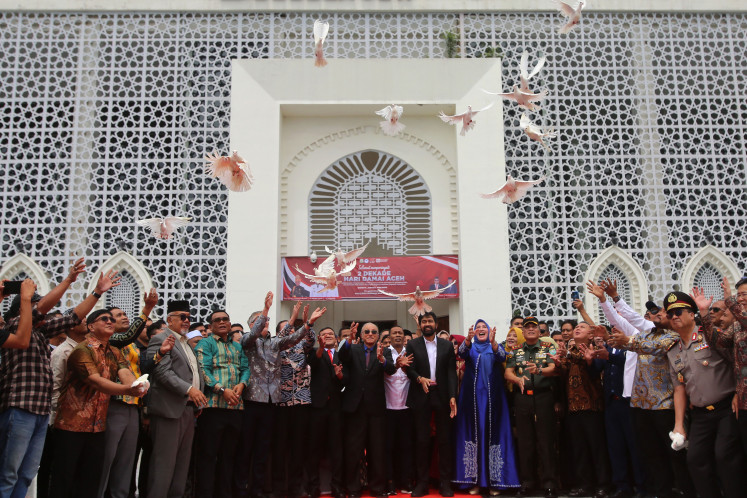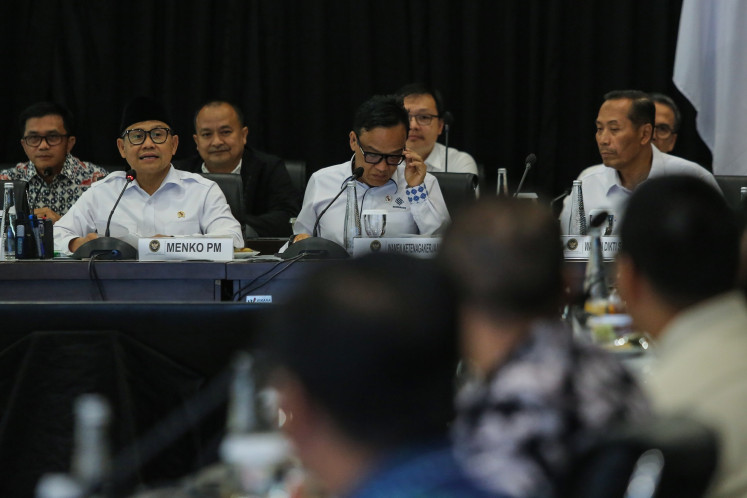Popular Reads
Top Results
Can't find what you're looking for?
View all search resultsPopular Reads
Top Results
Can't find what you're looking for?
View all search resultsHouse passes ambitious immigration bill
After six years of deliberations, the House of Representatives passed an immigration bill on Thursday expected to help expatriates with Indonesian spouses and the children of mixed marriages
Change text size
Gift Premium Articles
to Anyone
A
fter six years of deliberations, the House of Representatives passed an immigration bill on Thursday expected to help expatriates with Indonesian spouses and the children of mixed marriages.
Fahri Hamzah, chair of the special committee deliberating the bill with the government, said it was this year’s most monumental legislation.
The bill would give incentives for expatriates to invest in Indonesia and also reform the nation’s complex immigration procedures, Fahri said.
“Through the bill, the House and the government have shown a humane face to their power [including] ideas, input and support from all stakeholders, including non-governmental organizations, expatriates and their Indonesian spouses,” he said at the House’s plenary session, which was presided over by House Deputy Speaker Priyo Budi Santoso.
Law and Human Rights Minister Patrialis Akbar praised the bill’s far-reaching impact on the lives of expatriates and its impact on global mobility.
“Foreign investors, missionaries and social workers who have worked and stayed for three cosecutive years are allowed to apply for permanent stay permits, while expatriates who have married Indonesians need only two years to get a permanent stay permit. Moreover, their foreign spouses are allowed to seek jobs and make money,” he said.
All permanent stay permit recipients, however, must report to the immigration office every five years, although they will no longer be charged fees.
The bill, which revises the 1992 Immigration Law, says expatriates with two-month social-cultural visas can apply for limited stay permit after marrying Indonesians. The permit will be revoked if the expatriates divorce within 10 years of their marriage.
Limited stay permits will also be granted to children born in Indonesia who have one parent who has a limited stay permit.
Patrialis said the new law contains changes on par with “actual developments” brought on by “increased mobility” due to globalization and efforts to keep the administration in line with international conventions that Indonesia has signed.
Immigration requirements for investors in Indonesia would also be eased, he said.
“Permanent residency permits can be given to investors who have stayed in Indonesia consecutively for three years,” he said on Thursday, a period less than the five years stipulated by the 1992 law.
Deliberation on the bill was not without drama. Two key provisions on mixed marriages were that had been unexpectedly dropped from the bill were reinstated in time for Thursday’s deliberations.
The bill won a full support from a group of expatriates and Indonesians in mixed marriages at the House on Thursday.
Members of the group were pleased that foreign citizens in mixed marriages and the children of mixed marriages holding dual citizenship could now apply for permanent stay permits, according to a representative.
Julie Mace, spokeswoman for the Advocacy Team for Mixed Marriages, said she appreciated that the bill would give equal legal protection to mixed marriage families in Indonesia.
“Through the bill, the Indonesian government will facilitate expatriates and those in mixed marriages to get permanent residence and to work to support their family. The bill is a revolutionary change in the treatment of expatriates,” she said.
Julie’s daughter Isabelle, whose father is a French citizen, said she would take advantage of the bill to apply for permanent residency and look for a job to support her family.
“I have stayed for four years in Indonesia after staying for many years abroad but I am not allowed by the current immigration law to work here,” she said.










